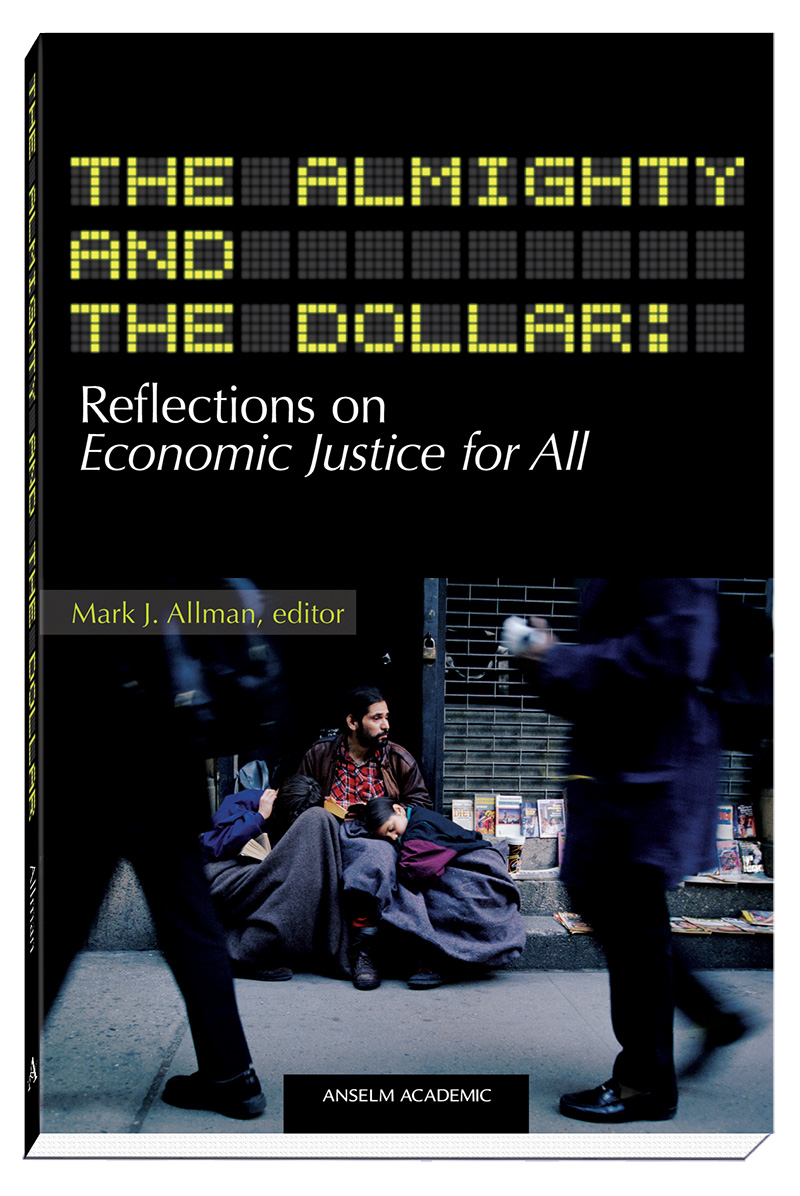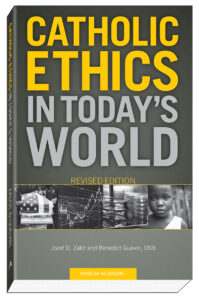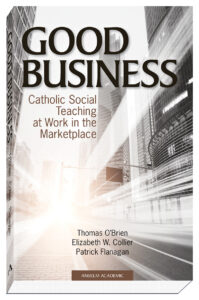The Almighty and the Dollar
Reflections on Economic Justice for All
About This Book
Overview
To download the articles by John R. Donahue and Archbishop Rembert Weakland on Economic Justice for All, scroll down.
The Catholic Church’s teachings on economic justice became mainstream media conversation when Mitt Romney picked Paul Ryan as his vice presidential running mate on the Republican ticket for the 2012 election. Ryan is the author of the much-talked-about “Ryan Plan,” a federal budget proposal that includes cuts in tax rates for big-income earners and corporations, as well as significant cuts to government spending on social services such as Medicare and aid to the poor, including Medicaid and food stamps. A practicing Catholic, Ryan claims his plan is inspired by his faith and in particular by the doctrine of Catholic Social Teaching (CST).
This claim drew strong criticism on several Catholic fronts, among them the U.S. Conference of Catholic Bishops, which said that Ryan’s budget plan “fails to meet” the moral criteria of CST. In spite of this criticism, Ryan maintains that his plan does indeed adhere to CST’s primary tenets. We are led then to some basic questions: What is Catholic Social Teaching, and what does it say about the economy? Is the Ryan Plan truly in accordance with CST, or is Ryan’s claim a political maneuver or misreading? Is there room for debate on what CST is?
The answers to many of these questions and more can be found in The Almighty and the Dollar, edited by Mark J. Allman. More than twenty-five years ago, the U.S. Catholic bishops wrote Economic Justice for All, a pastoral letter devoted to economic issues. In this letter the bishops engaged both scripture and CST to outline the Christian demands of economic justice. The Almighty and the Dollar draws on the ethical principles the bishops articulated in Economic Justice for All and applies them to contemporary topics such as welfare reform, racism, globalization, and other key issues. The volume begins with substantial excerpts from the original letter and includes chapters on some of the basic principles of CST.
Economic Justice for All at Age Twenty-Five: A Journey of Rememberance and Hope by John R. Donahue
Economic Justice for All Twenty-Five Years Later: A Response to the Papers Delivered by Rembert G. Weakland
Details
| Weight | 0.9 lbs |
|---|---|
| Dimensions | 6 × 1.5 × 9 in |
| Format | Softcover |
| Print ISBN | 978-1-59982-087-3 |
| Pages | 282 |
| Item # | 7041 |
|---|
Customer Reviews
“Twenty-five years ago the U.S. Catholic bishops published a document on Catholic social teaching and the U.S. economy. A group of nine scholars look now at that document and its contents and analyze, challenge, and clarify where we are today and bring new light and insights to the world scene without losing sight of those who are most adversely affected. The book is certainly worth the read and is highly recommended.”
“The Almighty and the Dollar is a vibrant reexamination of the U.S. Catholic bishops’ seminal teaching in their historic pastoral letter Economic Justice for All. This book is both steeped in the history of the pastoral letter and energized by its application to today’s world. It will be a touchstone for all who strive to live their faith in the marketplace.”
“This volume celebrates the 25th anniversary of Economic Justice for All, a notable pastoral letter of the U.S. bishops. The text is more than a worthy commemoration because Mark Allman has brought together a fine array of scholars who retrieve insights of the letter and develop excellent ethical reflections appropriate to our present economic situation.”
“This important book about an important Church document and its implementation invites readers to study and understand Economic Justice for All and its ramifications for a just society. The text reflects the theologian’s role in the critical application of faith to reality and in stretching that faith to emerging realities. The book emphasizes central principles of Catholic social thought, including solidarity, participation, the universal destination of all creation, right relationships, and the preferential love of the poor. Then it applies them to contemporary challenges of globalization, poverty, welfare reform, racism, white economic advantage, immigrant justice, the world ecosystem, food security, and, perhaps surprisingly, worship. The readers challenges are many: to understand what the pastoral letter did and did not say; to grasp the revolutionary nature of the participative process used to develop the document; to appreciate the funding of a three-year implementation office to produce educational and pastoral resources; to reach beyond what was into the future; and to discern the strengths and weaknesses of the pastoral. Discussion questions at the end of the chapters assist readers with these challenges.”
Loyola University, New Orleans
Table of Contents
Introduction: Serving Two Masters?
History and Reaction
Principles of Catholic Social Teaching
Part 1
Economic Justice for All: Pastoral Letter on Catholic
Social Teaching and the U.S. Economy
(Excerpt with CHAPTERS I, II, IV, and V)
United States Catholic Bishops, 1986
A Pastoral Message: Economic Justice for All
Why We Write
Principal Themes of the Pastoral Letter
A Call to Conversion and Action
I: The Church and the Future of the U.S. Economy (nos. 1–27 )
A. The U.S. Economy Today: Memory and Hope
B. Urgent Problems of Today
C. The Need for Moral Vision
II: The Christian Vision of Economic Life (nos. 28–126)
The Christian Vision of Economic Life
A. Biblical Perspectives
B. Ethical Norms for Economic Life
C. Working for Greater Justice: Persons and Institutions
D. Christian Hope and the Courage to Act
IV: A New American Experiment: Partnership for the Public Good (nos. 295–325)
A. Cooperation within Firms and Industries
B. Local and Regional Cooperation
C. Partnership in the Development of National Policies
D. Cooperation at the International Level
V: A Commitment to the Future (nos. 326–365)
A. The Christian Vocation in the World Today
B. Challenges to the Church
Part II
Foundational Issues of Economic Justice
1: Economic Justice and the New Challenges of Globalization
David Hollenbach, SJ
Introduction
The Meaning of Globalization
Catholic Social Thought and Globalization
Institutional Dimensions of Globalization
Overcoming Poverty: Practical Reflections
Conclusion
2: Catholic Social Thought as an Empirical Claim
Daniel K. Finn
Introduction
The Historical Impact of Catholic Social Thought
What Does Catholic Social Thought Recommend?
What Is Sustainable Prosperity for All?
Social Capital and Catholic Social Thought
Conclusion
3: Considering a Solidarity Economy as a Framework for Justice
Rebecca Todd Peters
Introduction
The Loss of Living Wages and Benefits
Neoliberal Economics and Environmental Sustainability
Considering a Solidarity Economy
Contributions of Solidarity to a More Just Economy
Social Justice as the Prophet Principle
Sustainability as the Caretaking Principle
Examples of a Solidarity Economy
Conclusion
4: Participation as a Moral Measure of the Economy
Mark J. Allman
Introduction
Participation
Participation in Catholic Social Teaching
Amartya Sen and Development as Participation
Conclusion
Part III
Contemporary Issues of Economic Justice
5: Fighting Poverty and Providing Safety Nets:
An Agenda for US Catholic Advocacy in Social Policy
Thomas Massaro, SJ
Introduction
Influencing Public Policy: Catholic Social Thought
and Church Leadership
Advocacy Efforts of the Bishops’ Conference
The Contribution of the Pastoral Letter Economic Justice for All
Progress toward Universal Health-Care Coverage
Conclusion
6: Where Y’at Race, Whiteness, and Economic Justice?
A Map of White Complicity in the Economic Oppression of People of Color
Alex Mikulich
Introduction
The Reality of Race Today
Christian vs. American Values
How EJA Addresses the Intersection of Race and Poverty
White Economic Privilege and Racial Oppression
Placing Whiteness: A History and Enduring Legacy
The Where and How of Whiteness
Conclusion: Contending with Whiteness in the Struggle
for Economic Justice
7: Who Is Still Missing? Economic Justice and Immigrant Justice
María Teresa Dávila
Introduction
The Place of the Immigrant in Economic Justice for All
Immigrants and Economic Justice
What’s Wrong with This Picture? Three Possible Causes
for This Dangerous Split
Integrating Justice: A Holistic Vision for Justice and Solidarity
Conclusion
8: Becoming Synergoi: Food, Justice, and Economic
Cooperation
Margaret R. Pfeil
Introduction
Cooperation
Food Justice: Cultivating Relationships between Urban and Rural
Local Communities
Linking Cooperation, Food, Liturgy, and the Integrity of Creation:
Justice as Right Relationship
Conclusion
9: Liturgy, Discipleship, and Economic Justice
Christopher P. Vogt
Introduction
Connecting Liturgy and Justice: A Missed Opportunity in
Economic Justice for All
Not by Liturgy Alone: Liturgy and Catechesis
The Challenge of “Lifeless Liturgies”
Conclusion
Contributors
Index
Professional Reviews
The impetus for this book was the editor’s desire to mark the 25th anniversary of the US bishops pastoral letter, Economic Justice for All (EJA). This well-conceived collection builds on EJA and does not merely summarize or reiterate its points.
The volume is divided into three parts: (1) a substantial excerpt of the original pastoral letter; (2) four essays dealing with foundational aspects of economic justice; and (3) five essays that address topics inadequately addressed in the original letter. Two additional essays completed post-publication are available online. Those two essays are of particular interest, since they were written by principals involved in the original formulation of the letter: Rembert Weakland, chair of the episcopal drafting committee, and John Donahue, who served as a consulting scholar in the writing of EJA. An essay by David Hollenbach, another academic consultant, is also included in the book.
Weakland reflects on what would have to change if a similar letter were to be written today. He accepts the challenges/criticisms that authors in part 3 make of the pastorals shortcomings—for example, neglect of migration and race. Donahue presents a record of the process and some highlights of the letter, as well as reflections on the implicit ecclesiology at work in the letter’s formulation. He laments the failure to sustain and develop that ecclesiology in subsequent years. He also provides extensive reference notes to writings on economic justice since EJA. Hollenbach focuses on globalization, perhaps the most prominent economic factor emergent since EJA. He comments on current discussion among development theorists and how Catholic teaching might enter into present thinking about achieving justice for the developing world.
The remaining essays are all solid. Most have an analytic/expository style, although a few reflect a more prophetic and challenging tone, even while being appreciative of the achievement of EJA. The book would be a fine text to include in a course in Catholic social thought. It reminds us both of the benefits of an effective teaching office and that Catholic social teaching requires ongoing reflection and evolution.





